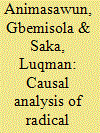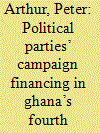| Srl | Item |
| 1 |
ID:
124487


|
|
|
|
|
| Publication |
2013.
|
| Summary/Abstract |
This article attempts an agential explanation of the raison d'être for Jama'atu Ahlis Sunna Lidda'awati wal Jihad, also known as Boko Haram (meaning Western education is forbidden), an Islamist sect that came to public consciousness in 2009 after the extra-judicial killing of its leader. Conceptualising Nigeria as a weak state, the article identifies the failed prebendal relationship between politicians in northern Nigeria and members of Boko Haram, and the extra-judicial killing on 30 July 2009 of Mohammed Yusuf, as agential causations of the current wave of radical Islamism. The article argues for the need to transcend the orthodox interpretation of the current wave of Islamist terrorism being demonstrated by the Nigerian state to a more nuanced approach that pays attention to the essentialist, psychological, political and economic perspectives of Islamist terrorism at the structural and individual levels.
|
|
|
|
|
|
|
|
|
|
|
|
|
|
|
|
| 2 |
ID:
157192


|
|
|
|
|
| Summary/Abstract |
The period from 1992 saw Ghana, under pressure from both internal and external sources, embark on the transition to democratic rule. Despite the strides, an issue that has the potential to undermine Ghana’s liberal democratic credentials has centred on the process of political party financing. The purpose of this paper is to analyse how the existing political party financing system in Ghana is negatively impacting on electoral competition and the country’s democratic process. Drawing on secondary sources, this paper shows that, given that it is political resources that drive party vibrancy and competitiveness, a level playing field in terms of public financing of political parties can help in electoral competition and the promotion of the democratic process in Ghana. However, the importance of transparency and accountability, as well as a legal framework that monitors, denounces, sanctions and punishes abuse in the use of public funds, would be crucial if success is to be attained.
|
|
|
|
|
|
|
|
|
|
|
|
|
|
|
|